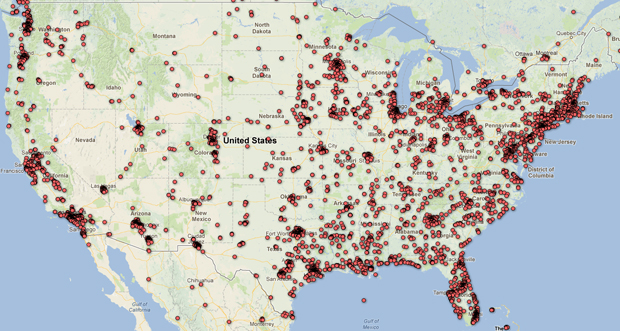Study: Twitter could be used to track spread of HIV
Social media sites such as Twitter and Facebook have become ubiquitous among teenagers, but medical professionals could one day use status updates and tweets to track and prepare for the spread of disease.
An article published in the journal Preventive Medicine looks at how Twitter can help identify patterns of HIV cases, and potentially prevent the spread of the virus that causes AIDS.
Using the location data of specific tweets and location data of reported HIV cases, researchers at the University of California Los Angeles and Virginia Tech were able to determine that the area of those tweets matched the areas where the highest numbers of HIV cases were recorded.
Using an algorithm, they found that out of more than 550 million tweets surveyed, nearly 10,000 tweets contained words or phrases that suggested risky sexual behavior, such as "sex" or "going to use drugs." Geolocation data was then compared with the 2009 geographical distribution from AIDSVu.org, a website that provides interactive maps and statistics about HIV cases in the US.
"Our study focuses on behavior and prediction of behaviors -- we look at words and phrases that suggest that people are or are about to be behaving in a certain way. Behavior is important as it allows us to use the psychology of the tweets to potentially predict future behavior and disease," co-author Sean Young, an assistant professor of family medicine and the director of innovation at the UCLA Center for Behavioral and Addiction Medicine, told CBS News in an email.
This study is the latest indication that social media could help the medical community gather data in ways that traditional methods, such as surveys, cannot. For one thing, it's faster -- it can take the Center for Disease Control over two weeks to publish findings.
"Poll answers are filtered by perception or memory; on Twitter, we're actually observing real behavior [in real time]," Christophe Giraud-Carrier, an associate professor of computer science at Brigham Young University, told the Washington Post last year.
Geolocation, as shown in the HIV study, could also prove to be useful -- especially in the event of an epidemic. Hospitals can get ready for outbreaks of the flu based on trends in Twitter data. Doctors can determine where the highest number of illnesses are occurring and take preventative measures. Geotagged tweets could also help health officials determine which locations have higher risks of certain environmental or genetically-based conditions, such as cardiovascular disease, and decide whether more education is needed in those specific areas.
In spite of all the possible positive uses, some researchers and health officials are still wary of relying on Twitter. Though it offers a vast wealth of information, it can be difficult for researchers to separate the useful information from all that noise. There are also privacy concerns, even though most tweets are public information.
Young says he would have agreed that the negatives outweighed the positives -- 10 years ago. Now, he feels that since the widespread use of social media has increased public health problems -- by allowing more people easy access to drugs or quick sexual encounters -- public health officials must use these same technologies to improve public health.
"Just as we would not board a plane without knowing that it was collecting real-time data to monitor passenger safety, health departments must collect and monitor real-time data to improve the safety of individuals," Young said.
